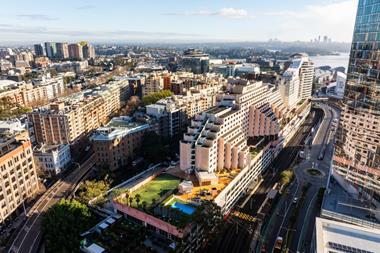AustralianSuper is sifting through more than half a dozen “live” opportunities, worth up to A$3bn (€1.9bn), in the private credit markets of Europe and the US.
“We are talking about refinancing and construction loans, primarily to the real estate and infrastructure sectors,” said Nick Ward, the newly-promoted head of private credit at the A$225bn superannuation giant.
Ward told IPE Real Assets that, over the next three years, AustralianSuper intended to grow the portfolio up to A$15bn in private credit across Australia, Europe and the US.
He said the fund was hiring more specialists for its debt teams in London and New York to source lending opportunities. In particular, six more people will be recruited to join its New York team, and to replicate its capability in London.
“Currently, we have a A$5bn private credit portfolio,” he said. “Of that, A$4.5bn is direct loans and evenly split between Europe and the US.”
The balance is in loans to the property sector in Australia, managed by Melbourne-based real estate lender, MaxCap.
Ward said the fund’s preference was to be involved with direct lending, and this had been the approach since entering offshore markets five years ago.
It was in 2016, he said, that the fund had made its first direct investment, a A$500m loan to the Spanish toll road operator, Itinere, to refinance some of their long-term debt.
Earlier this year, AustralianSuper made an A$550 million direct loan to a Blackstone portfolio company in the European logistics space and is seeking to increase that further as its portfolio continues to grow.
Ward declined to reveal the identity of the borrower. It was one of what he described as a “chunky” loan (upwards of A$100m), of which he hopes the AustralianSuper would make more such transactions in coming months.
“We continue to expect opportunities in industrial logistics assets and residential or apartment living, coming out of the pandemic we are seeing strong tailwinds in these sectors” he said.
AustralianSuper is currently evaluating prospects to lend to borrowers planning large-scale development of student housing in the UK and Europe. “Another area will be office,” he said.
“The jury is definitely out on what the future holds for office. We will selectively fund office, especially projects designed to cater to the post-COVID environment. These will have greater emphasis on health and safety measures for the workforce and collaborative spaces to bring people back to the office.”
Ward said there would be more transport opportunities in infrastructure as a result of the ongoing pandemic.
Recently, AustralianSuper participated in a new financing for Heathrow Airport, shared equally with an infrastructure debt manager for a £750m tranche of “deeply subordinated” debt.
“Heathrow continues to be hugely disrupted,” Ward said. “Traffic was down over 90% at different stages last year, and it decided to raise capital to manage its overall debt book and liquidity profile.”
Heathrow is a large issuer of debt, and has several levels to its capital structure, according to Ward. “The first couple of levels are rated investment grade, and they trade on skinny returns. We are in what we call the deeply subordinated position in Heathrow’s debt structure.”
The further a lender moves down the capital structure, the higher the risk, he said. But returns were higher to compensate for the risk.
Given its size, AustralianSuper is seeking to play in the top spectrum of the private credit market, where it can achieve scale and secure a premium that comes with complexity and illiquidity, Ward said.
But competition is keen, even at this level. “We have lost our fair share of deals,” he said. “But we like to think we remain disciplined. Private credit is not our only strategy, as we can invest across asset classes in private equity, infrastructure and/or listed equity.
“When we lend, we take a one-fund approach. We can switch between equity or debt, depending on the particular opportunity and where we see the best risk-adjusted return.”


















